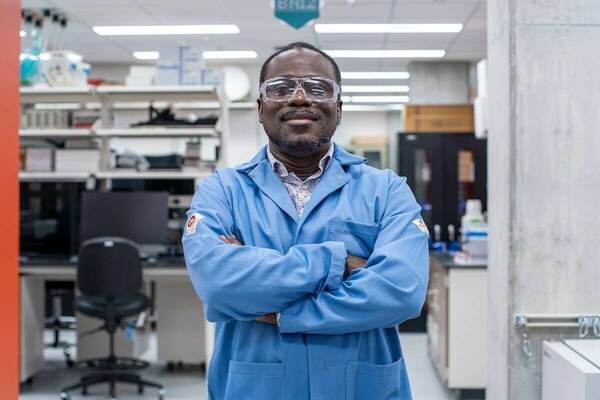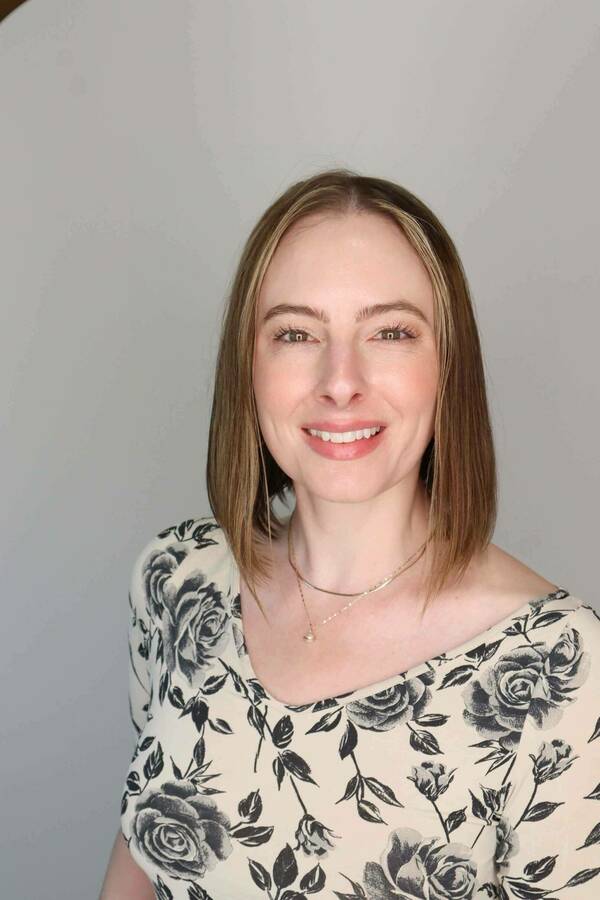As the Harper Cancer Research Institute’s first-ever associate director for translational research, Herman Sintim is working to turn discoveries into new tools for fighting cancer
Sintim brings a wealth of expertise in both basic science and entrepreneurship to his new role.
Herman Sintim, the Grace-Rupley Professor of Chemical Biology at the University of Notre Dame, knows how to kill cancer. As a distinguished medicinal chemist, Sintim has made important discoveries about the chemistry of next-generation treatments, such as kinase inhibitors and immunotherapy, used to target cancer cells.
But in his two decades of work on cancer, Sintim has also learned that when it comes to killing cancer, there is a big difference between what works in the lab and what clinicians on the front lines of the fight against cancer can use in their work. And it is his special expertise in bridging that gap that he will bring to his new role as the first-ever associate director for translational research at Notre Dame’s Harper Cancer Research Institute.
“I hope to be a kind of catalyst for translational research,” Sintim explained. “My role is about bringing people together and creating the right kind of environment for discoveries to move out of the lab and into the clinic.”
Sintim’s work as a “catalyst” will draw upon the two very different sides of his career, which has included both fundamental discoveries about cancer as well as entrepreneurial efforts aimed at bringing those discoveries to the people who can benefit from them.
Sintim’s research began at the University of Oxford, where he completed his doctorate in organic chemistry. Then, following postdoctoral positions at Oxford and Stanford Universities, he accepted his first faculty position at the University of Maryland at College Park (UMD). At UMD, he earned tenure and was promoted to the rank of professor while making fundamental discoveries about chemical biology and organic synthesis.
After nearly ten years at UMD, a move to Purdue University to accept an endowed professorship in drug discovery opened new doors for Sintim to think beyond fundamental research. Inspired by an environment that prized entrepreneurship and innovation, Sintim went on to file seven patents and co-founded KinaRx LLC, eventually receiving two grants from the U.S. Small Business Administration’s Small Business Innovation Research program.
Now Sintim’s new role at HCRI will allow him to help faculty who are inspired to follow a path similar to his own.
“Researchers want to be a force for good and make a difference for people battling cancer, so they tend to be excited when they see research translating into better outcomes for patients,” Sintim said.
According to M. Sharon Stack, the Ann F. Dunne and Elizabeth Riley Director of HCRI, Sintim will focus first on strengthening connections across campus.
“To translate new insights into the clinic, researchers need to think about a complex process from filing patents to understanding the needs and interests of industry partners,” said Stack, who is also the Kleiderer-Pezold Professor of Chemistry & Biochemistry. “Fortunately, we have many resources for doing that here at Notre Dame, including the IDEA Center, the Warren Center for Drug Discovery, and others. I can’t think of a better person than Herman to identify synergies between HCRI’s work and the work of other units on campus,” she said.
In addition to deepening on-campus partnerships, Sintim aims to connect Notre Dame to outside collaborators, both at businesses at other universities.
In particular, Sintim said, biotech companies and startups can help researchers think about their work in new ways. “Bringing industry experts to campus to meet with faculty, provide insights, have pitch sessions, and more is valuable for getting very honest feedback. And it can help researchers bring a new mindset and new questions to their research.”
Sintim will also work through the Indiana Clinical and Translational Sciences Institute (Indiana CTSI) to connect Notre Dame researchers to researchers across the state. During his time at Purdue, Sintim participated in Indiana CTSI, receiving a grant along with a colleague at Indiana University School of Medicine that eventually led to two grants from the National Institutes of Health.
Ultimately, Sintim says, his broader goal is about enhancing the research culture at the University.
“If you put the right resources in place, but you don't build a culture, then it won’t take off,” Sintim said. “So it’s not just about having all the right ingredients in place. It’s also about seeing translational research as part of our mission and our reason for doing research — that will be the driving force.”
Contact:
Brett Beasley / Research Content Strategy Program Director
Notre Dame Research / University of Notre Dame
bbeasle1@nd.edu / +1 574-631-8183
research.nd.edu / @UNDResearch
Photos by Angelic Rose Hubert.
About Notre Dame Research:
The University of Notre Dame is a private research and teaching university inspired by its Catholic mission. Located in South Bend, Indiana, its researchers are advancing human understanding through research, scholarship, education, and creative endeavor in order to be a repository for knowledge and a powerful means for doing good in the world. For more information, please see research.nd.edu or @UNDResearch.
Latest Research
- Fall 2025 SAI Graduate Fellowship Program: Applications Open NowNotre Dame Scientific Artificial Intelligence (SAI) Graduate Fellowship The Notre Dame Scientific Artificial Intelligence (SAI) Initiative is excited to announce a semester-long Fall 2025 fellowship program for PhD students seeking to newly…
- Merlin Bruening named 2025 Outstanding Teacher in Notre Dame College of EngineeringMerlin Bruening, the Donald and Susan Rice Professor of Engineering in the Department of Chemical and Biomolecular Engineering, has won the 2025 Outstanding Teacher Award in the Notre Dame College of Engineering.
- Notre Dame Research, Athletics address challenges of ACL tears, sleep loss, and stress in new joint research projectsNotre Dame Research and Athletics have awarded three research teams the first-ever Human Performance & Wellness Research Grants. The grants will provide funding to support exceptional research projects that contribute meaningfully to fields related to the health, well-being, and performance of…
- Expanding endometriosis research: Postdoctoral researcher Ell Handy focuses on women’s healthEll Handy, a postdoctoral researcher at the University of Notre Dame with the Bioengineering Life Sciences Initiative (BELS), seeks to uncover new ways to diagnose and treat endometriosis,…
- ND Expert Arun Agrawal: The Holy Father’s vision in Laudato Si’ is both a beacon and a cautionArun Agrawal, the Pulte Family Professor of Development Policy at the Keough School of Global Affairs and inaugural director of the Just…
- Statement from University President Rev. Robert A. Dowd, C.S.C., on the passing of Pope FrancisUniversity of Notre Dame President Rev. Robert A. Dowd, C.S.C., joined today with leaders worldwide in mourning the death of Pope Francis at age 88.

















